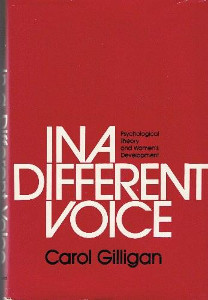
In a Different Voice
In a Different Voice: Psychological Theory and Women's Development is a book on gender studies by American professor Carol Gilligan, published in 1982, which Harvard University Press calls "the little book that started a revolution".[1]
Author
In the book, Gilligan criticized Kohlberg's stages of moral development of children. Kohlberg's data showed that girls on average reached a lower level of moral development than boys did. Kohlberg's theory (based on his 1958 dissertation) had been developed on a sample of boys (as he had been advised to do). Gilligan stated that the scoring method Kohlberg used tended to favor a principled way of reasoning (one more common to boys) over a moral argumentation concentrating on relations, which would be more amenable to girls.[1] The analysis by Gilligan about Kohlberg's theory was later challenged, although the debate about Kohlberg's model not representing the full scope of the moral domain remains active.[2]
Controversy[edit]
Some have critiqued the work.
Christina Hoff Sommers argues in The War Against Boys that, "Gilligan has failed to produce the data for her research". Gilligan argued in response that, "her findings have been published in leading journals and that Sommers' points are not accurate," even though access to the raw data has been consistently denied to other researchers.[6]
Reviews by Walker (2006) and Jaffee and Hyde (2001) found that Gilligan's theory was not supported by empirical studies. Her study conducted on 80 people
[7] which served as a base for her theory was later challenged by neo-Kohlbergian studies with the Defining Issues Test, in which females tend to get higher scores than males, though generally not significantly so.[8]
In her article "Power, Resistance and Science", Naomi Weisstein makes a general argument against what she describes as "feminist psychologists", who "put forth a notion of female difference which, while no longer biologically based, is nevertheless essentialist, or at least highly decontextualized, for example, Carol Gilligan, In a Different Voice (1982); Sara Ruddick, Maternal Thinking: Towards a Politics of Peace (1990). That is, they assume that female difference is fixed, rather than contingent on social context."[9]